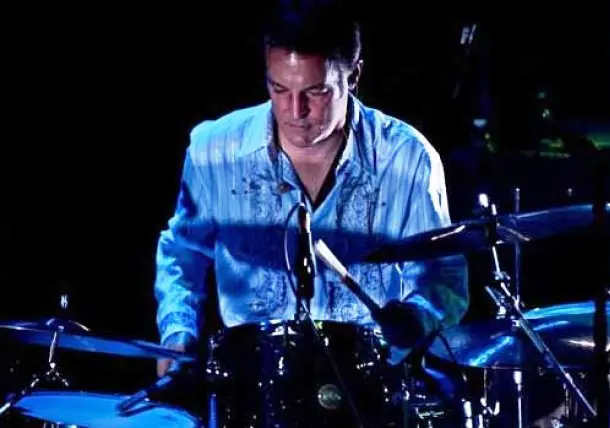Livin’ the Dream – Drummer, Dave Beyer


From the stage of Woodstock ’94, Dave Beyer soaked up the view of some 300,000 fans moving to his backbeat and thought, “I’m living the dream.” Drumming for Melissa Etheridge at this epic concert made Beyer realize he’d come a long way from the kid who set up his drums at the end of the driveway, singing and pounding out Beatles songs for all the ‘hood to hear.
“As a kid, imagining that I was playing for thousands of people, (when it was actually old ladies across the street closing their windows), and just visualizing doing what I wanted to do all along, was a huge part of the process,” said Beyer. “I never considered being anything else but a professional drummer—-so I simply went after it.”
During the 1990’s, Beyer recorded and toured the world with Etheridge for several years, and since then, has added many other name acts to his drumming resume, including The Motels, Jim Messina, Loggins & Messina, Jackson Browne, Michael McDonald, Gregg Allman, America, Wilson Phillips, Buzzy Feiten, Stephen Bishop and currently, with Christopher Cross.
Today, Beyer is an in-demand studio drummer who’s played on a slew of albums, TV and movie soundtracks; a producer (with his own recording studio); and a core instructor at L.A. College of Music (LACM) in Pasadena. Beyer is making a living doing what he loves, but says that bumpy van ride to the drum throne required a lot of will and hard work.
“I loved to pretend I was Ringo.”
KICKING IT OFF
“My parents were my first fans—-they were very supportive of my passion for drumming,” said Beyer. “When I was 3, I had to get stitches over my eye, and my mom said if I was brave she’d get me my first snare drum. After that, I pieced together a small set with what they could afford and set it up in the living room and jammed everyday.”
Beyer’s Dad even wired the room for sound so he could play along with the record player. “The Beatles were my favorite to play with—-I loved to pretend I was Ringo. Playing simply for the joy of playing is a vital part of music, of enjoying your craft. I recommend this to my students of all ages, but to keep it balanced with learning technique and new ideas.”
Beyer studied privately at the local music store from age 8, working on a variety of styles—-jazz, rock, funk, Latin—-and nailing down the rudiments. “These are the scales of drumming,” he said. “They aren’t as much fun as laying down a rock beat, but vital skills like paradiddles, flams and rolls are the foundation that everything else is built on.”
This foundation helped Beyer earn the drum chair in the elementary school Honor Jazz Band; and set him up for playing in a middle school funk band (where he was “the only white kid”).
“In that band, I got to play with musicians who went on to play with The Pointer Sisters, and Marvin Gaye,” remembers Beyer. “I learned to play funk music in the ‘70s with guys who really knew how to play it. Looking back on it now, I realize how deep that experience was.”
High school music took a different turn. Beyer got kicked out of marching band for “not lifting my knees high enough,” but no regrets—-he had already claimed the drum chair in the local college band. He later majored in music at Cal State University Los Angeles, where he played in the Big Band, Orchestra and Percussion Ensemble.
“Being able to read music is one of the most important skills to master, because it opens many doors and saves a tremendous amount of time.”
REAL WORLD EXPERIENCE
As Beyer continued to hone his chops, the phone started ringing. “I was playing everything and everywhere to get experience and make connections,” he said, recalling the rock clubs, cruise ships, musical theater shows, jazz bands, Big Bands, Disneyland, church gigs and a seemingly endless string of “casuals” (weddings and corporate parties).
All the while, he studied privately with renown drummers Chuck Flores and Ralph Humphrey. He zeroed in on technique, independence, and digging deeper into navigating a studio drum chart.
“Being able to read music is one of the most important skills to master, because it opens many doors and saves a tremendous amount of time,” said Beyer, who often has to sightread studio charts, like on his work for the “Extreme Makeover: Home Edition” TV series. “Keeping up the private study and continuously improving your craft goes hand-in-hand with getting lots of live playing experience—-both help you get and keep the gigs.”
It also helped Beyer land his first big teaching job, when Humphrey (now head of the L.A. College of Music (LACM) Drum Department), recommended Beyer to teach at Musician’s Institute in Hollywood. He taught there for about 8 years, and got more into the original band (artists or groups playing their own music) circuit, playing showcases and clubs in the L.A. area.
“So much of it is word of mouth, who you know, etc., so if you’re asked to sub for another player, or audition for a band or artist, it pays to do your homework and know your stuff.”
FINE TUNING THE DRUMMER DREAM
“I learned that many of the guys who were playing name act gigs were also playing in original projects with other musician friends,” Beyer said. “They were moving up the gig ladder and getting auditions based on the referrals of people they played with. Original bands may not pay much, but they are a rich source of connections.”
A self-help book called “The Viscott Method,” by radio psychologist David Viscott, also helped propel Beyer to the next level. “It said to write down your goals and all the steps that could lead to them,” remembers Beyer. “One New Year’s morning, after a casual in San Diego, I rode my bike to the top of a hill and started putting it all down on index cards—-“Get a gig with a name act,” and “Goals,” “Actions” and “Results.” I realized the most effective action I was taking to achieve my goal at that time was playing in original bands with other successful musicians.”
A few weeks later, it all materialized. A friend and bass player in one of the bands he played in, Mark Browne, recommended Beyer for an audition for Melissa Etheridge.
“That’s when I used a lot of the skills I’d been developing in the past,” said Beyer. “I went into action—-listening, playing along, and writing out the drum charts for her songs—-then I went in to the audition prepared and ready.”
This was the career-catapulting gig that put Beyer on the big map. With Etheridge, he did three world tours, which included performances at Madison Square Garden, Royal Albert Hall, Woodstock ’94, Rock ’n’ Roll Hall of Fame, late night TV; played on her “Your Little Secret” album and numerous soundtracks. Since then, he’s continued the impressive line-up of gigs and recordings with many other name artists, and has “used the same approach to every name act I’ve auditioned for or played with since,” Beyer said, including Christopher Cross, who he’s been touring worldwide with for the past 12 years (most recently in Japan). Beyer drums on his “Dr. Faith,” “Cafe Carlisle” and “One Night in Paris” albums, as well as the soundtrack to the TV show “30 Rock” and several live concert DVDs.
“So much of it is word of mouth, who you know, etc.,” said Beyer. “So if you’re asked to sub for another player, or audition for a band or artist, it pays to do your homework and know your stuff—-write charts, learn the tunes, really get to know the music—-and kill it. I’ve landed quite a few name act gigs by being the sub first.”
PASSING IT ON
Amid all the live concert and recording work, Beyer has maintained his teaching career, following Humphrey and drum legend Joe Porcaro to Los Angeles College of Music (LACM) in 2000. Beyer created and teaches the Rock Drumming, Recording for Musicians, Studio Drumming, and History of Gospel, Soul and R&B curriculums, at LACM, which is located in Pasadena. The college offers a Bachelor of Music (B.A.) degree—- in Music Performance, with a specific instrument emphasis; in Music Production, or in Music Composition/Songwriting. Students can also receive an Associate of Arts degree (A.A.), or enroll in the one-year Diploma Program, in any of the above mentioned areas. Rated as one of “The 20 Best Music Conservatories in the United States,” LACM attracts students from all over the world to its industry pro faculty, and real-world instruction to “create, record, perform and market in today’s competitive music industry.”
“It’s a great place to teach,” said Beyer. “I love the LACM formula—-students zero in on their craft or specific instrument, while developing all the skills they need in this industry—-from musicianship and reading to performance and production and marketing, it’s an all-inclusive experience,” said Beyer.
In specific genre courses, they dig deep into the significance of a music style. “We teach the history of the music style we’re studying, so you get the big picture of important artists and the historical, social and cultural significance of the times, then the students split into instrument-specific classes and focus on a song or two from that lesson,” said Beyer. “Then they play the song(s) in a band with pro musicians, have a few days to work on the music, and then play them again with fellow students at the school.”
Beyer guides the students in producing and recording their own original songs in the Recording For Musicians course. “They run the studio, set up the mics, run the mixing board, Pro Tools—-it’s very hands-on,” he said. And in the Studio Drumming class, Beyer gives students a taste of his own real-world experience. “I bring in a wide variety of charts from movies, albums, TV dates, jingles that I’ve played on in the studio, and teach the students how to navigate drum charts and lay it down.”
Beyer also gets to share his expertise and the LACM word by delivering drum clinics, often lining them up with tours like this summer in Europe with Christopher Cross. Andwhen the road calls, Beyer says LACM is supportive, because, “They want instructors who are actually walking the walk, playing professionally in their field. LACM is happy that we’re out there doing it and bringing our experiences back to the students.”
FINDING PROFESSIONAL BALANCE
Like playing the drums—-with all four limbs going at once—-Beyer has found a nice professional balance between touring, producing, recording and teaching. He says it’s vital to have a “hyphenate title” in this business, wearing several hats and being an all-purpose musician is a good thing.
“Without a doubt, the key to my longevity in the music business is versatility,” Beyer said. “When I’m not on tour, I can do recording sessions and teach. Sometimes it’s a tricky balancing act, but it keeps things fresh. I’m livin’ the dream.”
Author Debra Davis is an L.A.-based singer/songwriter who tours and plays locally with her Band of Gold. Songs from her 3 CDs:–”Complete,” “Angels in the Attic” and “Uninvited Guests” have been featured on numerous TV shows and films, and are available on iTunes, Pandora, Spotify, cdbaby and other music-related sites. Debra is also a frequently published journalist with the LA Times, Pasadena Weekly, Gig Magazine and other music related publications. http://www.






